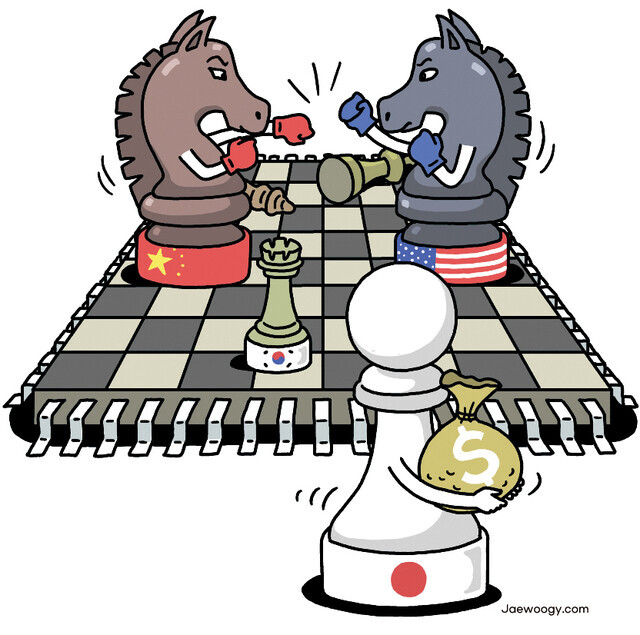hankyoreh
Links to other country sites 다른 나라 사이트 링크
[Column] In US-China chip war, Japan finds a path to victory

In the 1980s, Japan, then the world’s second-largest economy, surpassed the US in the semiconductor industry. Feeling threatened by Japan’s growing competitiveness in the strategically significant chip sector, the US went on the warpath against Japanese chipmakers, imposing retaliatory tariffs and initiating antidumping litigation.
In 1986, Japan reached an agreement with the US on semiconductors, which cleared the way for more imports of American-made chips. But even after that agreement, the US continued to take retaliatory measures against Japan based on Section 301 of the Trade Act.
While Japan had produced 51% of the world’s chips as late as 1988, its semiconductor industry soon went into decline. The US’ strategy of curbing Japan created an opportunity for the Korean semiconductor industry, which underwent rapid growth thanks to the market and technology provided by the US. (See: “Chip War: The Fight for the World’s Most Critical Technology” by Chris Miller.)
The latest “chip war” being waged by the US and China is bringing about another tectonic shift in the global semiconductor industry, creating an opening that Japan feverishly hopes to exploit.
Last October, one month after the US announced restrictions on semiconductor equipment designed to curb China, a number of major companies in Japan — including Toyota, Kioxia, Sony, NTT, Softbank, NEC, Denso and MUFG Bank — set up a semiconductor venture called Rapidus. The Japanese government also agreed to give the venture 70 billion yen (US$500 million) in funding.
The Japanese government has also been paying substantial subsidies to major chipmakers around the world that are willing to set up operations in Japan. Taiwanese chipmaker TSMC is building a plant in Kumamoto, while American chipmaker Micron Technology is building a big factory in Hiroshima. South Korean company Samsung Electronics is reportedly looking into an R&D facility in Yokohama.
Managers from chipmakers in South Korea, the US and Taiwan gathered together in Japan on May 18 at the invitation of Japanese Prime Minister Fumio Kishida for an unusual and highly evocative meeting.
Forty years ago, the US took steps to contain the Japanese semiconductor industry. But today, the US has become Japan’s strongest supporter.
Japanese Minister of Economy, Trade and Industry Yasutoshi Nishimura and US Commerce Secretary Gina Raimondo agreed to strengthen technological cooperation in the semiconductor sector in a joint statement released in Detroit on Friday. Intel, IBM and Google have also been announcing cooperative initiatives with Japanese chipmakers and universities.
Kim Il-hyuk, an analyst with KB Securities, believes the US is shifting toward a strategy of treating Japan as its semiconductor base in Asia because its push to onshore semiconductor production has been going more slowly than expected.
Japan has also been using its strength in the semiconductor materials, parts and equipment sector as leverage. Japan controls a 35% share of the global market for semiconductor equipment, ranking second after the US (40%), while controlling the global market for semiconductor materials with a 55% share.
In the past, Japan has exploited its dominant position in semiconductor materials, parts and equipment to exact economic retribution on South Korea.
Japan has announced it will place restrictions on exports of high-performance semiconductor manufacturing equipment to China in July. If those restrictions go into effect, they’re expected to have a major impact on China’s strategy of becoming self-sufficient in semiconductors.
While Korean companies find themselves in the dangerous predicament of being forced to choose between the US and China in their chip war, Japan is aggressively pushing a strategy of profiting from that conflict.
In their joint statement, the US and Japan promised to resolve the issue of relying on a specific region for their supply of semiconductors. That would mean shaking up the current concentration of chip production in Korea, Taiwan and China, which opens up space for the resurrection of Japan’s semiconductor industry.
Please direct questions or comments to [english@hani.co.kr]

Editorial・opinion
![[Editorial] Intensifying US-China rivalry means Seoul must address uncertainty with Beijing sooner than later [Editorial] Intensifying US-China rivalry means Seoul must address uncertainty with Beijing sooner than later](https://flexible.img.hani.co.kr/flexible/normal/500/300/imgdb/original/2024/0517/8117159322045222.jpg) [Editorial] Intensifying US-China rivalry means Seoul must address uncertainty with Beijing sooner than later
[Editorial] Intensifying US-China rivalry means Seoul must address uncertainty with Beijing sooner than later![[Column] When ‘fairness’ means hate and violence [Column] When ‘fairness’ means hate and violence](https://flexible.img.hani.co.kr/flexible/normal/500/300/imgdb/original/2024/0516/7417158465908824.jpg) [Column] When ‘fairness’ means hate and violence
[Column] When ‘fairness’ means hate and violence- [Editorial] Yoon must stop abusing authority to shield himself from investigation
- [Column] US troop withdrawal from Korea could be the Acheson Line all over
- [Column] How to win back readers who’ve turned to YouTube for news
- [Column] Welcome to the president’s pity party
- [Editorial] Korea must respond firmly to Japan’s attempt to usurp Line
- [Editorial] Transfers of prosecutors investigating Korea’s first lady send chilling message
- [Column] Will Seoul’s ties with Moscow really recover on their own?
- [Column] Samsung’s ‘lost decade’ and Lee Jae-yong’s mismatched chopsticks
Most viewed articles
- 1For new generation of Chinese artists, discontent is disobedience
- 2[Editorial] Transfers of prosecutors investigating Korea’s first lady send chilling message
- 3[Exclusive] Unearthed memo suggests Gwangju Uprising missing may have been cremated
- 4[Editorial] Intensifying US-China rivalry means Seoul must address uncertainty with Beijing sooner t
- 5S. Korea “monitoring developments” after report of secret Chinese police station in Seoul
- 6N. Korean media upgrades epithet for leader’s daughter from “beloved” to “respected”
- 7Yoon says concern about biased diplomacy is being incited by “communist totalitarian forces”
- 8[Column] US troop withdrawal from Korea could be the Acheson Line all over
- 9Xi, Putin ‘oppose acts of military intimidation’ against N. Korea by US in joint statement
- 1060% of young Koreans see no need to have kids after marriage